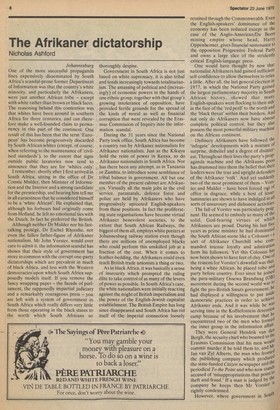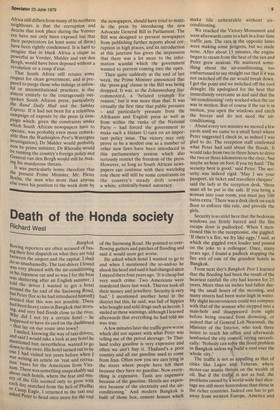The Afrikaner dictatorship
Nicholas Ashford
Johannesburg One of the more successful propaganda lines expensively disseminated by South Africa's scandal-prone former Department of Information was that the country's white minority, and particularly the Afrikaners, were just another African tribe except with white rather than brown or black faces. The reasoning behind this contention was that whites have been around in southern Africa for three centuries, and can therefore make a well-founded claim to permanency in this part of the continent. One result of this has been that the term 'European' has become progressively discarded by South African whites (except, of course, when referring to the maintenance of 'civilised standards'), to the extent that signs outside public lavatories now tend to announce that they are for 'whites only'. I remember, shortly after I first arrived in South Africa, sitting in the office of Dr Connie Mulder, then Minister of Information and the Interior and a strong candidate for the premiership, and hearing him tell me in all earnestness that he considered himself to be a 'white African'. He explained that, although his forbears had originally come from Holland. he felt no emotional ties with the Dutch. In fact he preferred the British.
Although neither Dr Mulder nor his fasttalking protégé, Dr Eschel Rhoodie, nor even the fallen father-figure of Afrikaner nationalism, Mr John Vorster, would ever care to admit it, the information scandal has shown that their style of government has more in common with the corrupt one-party dictatorships which are prevalent in much of black Africa. and less with the Western democracies upon which South Africa supposedly models itself. If you remove the fancy wrapping paper the facade of parliament, the supposedly impartial judiciary and a remarkably courageous press you are left with a system of government in South Africa which really differs very little from those1 operating in the black states to the north which South Africans so • _ thoroughly despise.
Government in South Africa is not just based on white supremacy. it is also tribal and tends increasingly towards totalitarianism. The amassing of political and (increasingly) of economic powers in the hands of one ethnic group, together with that group's growing intolerance of opposition, have provided fertile grounds for the spread of the kinds of moral as well as financial corruption that were revealed by the Erasmus Commission of Inquiry into the information scandal.
During the 31 years since the National Party took office, South Africa has become a country run by Afrikaner nationalists for Afrikaner nationalists. Just as the Kikuyu hold the reins of power in Kenya, so do Afrikaner nationalists in South Africa. Nor has there been any attempt, as in Tanzania or Zambia. to introduce some semblance of tribal balance in government. All but one member of the present cabinet are Afrikaners. Virtually all the main jobs in the civil service, parastatals, defence force and police are held by Afrikaners who have progressively uprooted English-speakers from these positions. In fact the proliferating state organisations have become virtual Afrikaner benevolent societies, to the extent that South African Railways, the biggest of them all, employs white porters at Johannesburg railway station even though there are millions of unemployed blacks who could perform this unskilled job at a fraction of the cost. When it comes to feather-bedding, the Afrikaners could even teach British trade unionists a thing or two.
As in black Africa, it was basically a sense of insecurity which prompted the ruling elite to take control of as many of the levers of power as possible. In South Africa's case, the white nationalists were initially reacting against the might of British imperialism and the power of the English-Jewish capitalist establishment. The British Empire has long since disappeared and South Africa has rid itself of the imperial connection loosely retained through the Commonwealth. Even the English-speakers' dominance of the economy has been reduced except in the case of the Anglo-American/De Beers mining empire whose head, Harry Oppenheimer, gives financial sustenance to the opposition Progressive Federal Party and owns a large slice of the stridentlY critical English-language press. One would have thought by now that nationalist Afrikaners had gained sufficient self-confidence to allow themselves to relax a little. After all, the last general election in 1977, in which the National Party gained the largest parliamentary majority in South African history, showed that manY English-speakers were flocking to their side in the face of the 'red peril' to the north and the 'black threat' within their borders. And not only do Afrikaners now have almost complete political control, but they als° possess the most powerful military machine on the African continent.
Ordinary Afrikaners have followed the infogate' developments with a mixture of surprise, disbelief and a degree of disinterest. Throughout their lives the party's prop' aganda machine and the Afrikaans press has drummed into them the belief that their leaders were the true and upright defenders of the Afrikaner 'yolk'. And yet suddenly two of the most prominent of them Vors' ter and Mulder have been forced (Nit of office in disgrace, while a host of lesser luminaries are shown to have indulged in all sorts of unsavoury and dishonest activities.
The fall of Vorster was particularly polg' nant. He seemed to embody so many of the solid. God-fearing virtues of which Afrikaners are proud. During his last five years as prime minister he had dominated the South African scene like a Colossus -3 sort of Afrikaner Churchill who corn' manded intense loyalty and admiration from his followers. Yet this Colossus bast now been shown to have feet of clay. One 01 the reasons for Vorster's downfall was that, being a white African, he placed tribe and, party before country. Ever since he joino, the para-military Ossewa Brandwag (00) movement during the second world war to fight the pro-British Smuts government..he had displayed a willingness to put aside democratic practices in order to achieve Afrikaner ends. And it was while he Os serving time in the Koffiefontein detention camp because of his involvement that he, encountered two of the men who forme,' the inner group in the information affair' They were General Hendrik van den Bergh, the security chief who boasted to thde Erasmus Commission that his men wo11,1 commit murder if he told them to, and Al.; Jan van Zyl Alberts, the man who fronted the publishing company which produce the state-funded Citizen newspaper and the periodical To the Point and who now stand5 accused of 'misappropriations that point t° theft and fraud.' If a man is judged bY company he keeps then Mr Vorster rightly condemned. However, where government in Sontil Africa still differs from many of its northern neighbours is that the corruption and deceits that took place during the Vorster era have not only been exposed but that their perpetrators (at least some of them) have been rightly condemned. It is hard to imagine that in black Africa a clique as Powerful as Vorster, Mulder and van den Bergh, would have been deposed without a revolution or a coup d'etat. That South Africa still retains some respect for clean government, and is prepared to purge those who indulge in unlawful or unconstitutional practices, is due almost entirely to the courageously outspoken South African press, particularly the Rand Daily Mail and the Sunday Express. If it had not been for a relentless campaign of exposés by the press (a campaign which, given the constraints under Which South African newspapers have to Operate, was probably even more remarkable than the Washington Post's Watergate investigation), Dr Mulder would probably now be prime minister, Dr Rhoodie would be running the country's foreign policy and G. eneral van den Bergh would still be making his murderous threats. It was particularly ironic therefore that the present Prime Minister, Mr. Pieter Botha, the man who more than anyone else owes his position to the work done by the newspapers, should have tried to muzzle the press by introducing the new Advocate General Bill in Parliament. The Bill was designed to prevent newspapers from publishing further reports about cor-, ruption in high places, and its introduction at this juncture has given the impression that there was a lot more to the information scandal which the government wanted to prevent coming into the open.
Then quite suddenly at the end of last week, the Prime Minister announced that the 'press gag' clause in the Bill was being dropped. It was, as the Johannesburg Star commented, a 'belated triumph for reason,' but it was more than that. It was virtually the first time that public pressure — and particularly pressure from the Afrikaans and English press as well as from within the ranks of the National Party — had forced the government to make such a blatant U-turn on an important policy issue. The victory may only prove to be a modest one as a number of other new laws have been introduced in this parliamentary session which also seriously restrict the freedom of the press. However, so long as South African newspapers can continue with their watchdog role there will still be some constraints on the country's steady drift towards a white, ethnically-based autocracy.











































 Previous page
Previous page